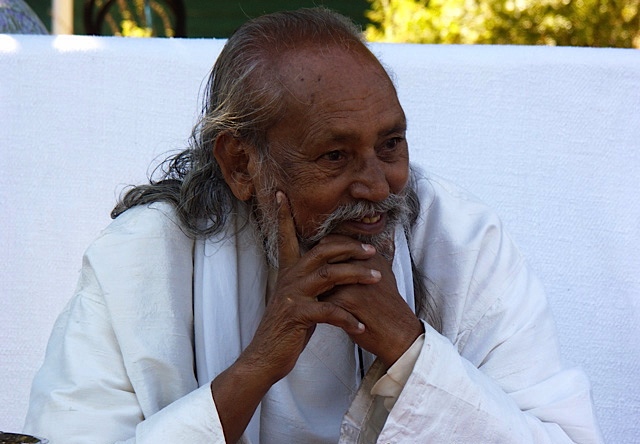Choosing Peace
Most of us spend a lot of time dreaming about the future. Sometimes we fantasize that at some point in the future we’ll have it all together, we’ll have what we want, and we’ll finally be able to relax and be happy.
I’m sorry to spoil the dream, but remember that this is a fantasy. You will never manage to arrange things so that you get all the things you want and avoid all the things you don’t want. The game is rigged.
It never works. You can’t find happiness in outer objects because everything is changing, mortal, and unreal.
The good news is that you can do something about it – not by rearranging your life, but by and adjusting how you respond to life. Babaji calls this changing the angle of the mind.
What do you find yourself dwelling on? Notice if those thoughts bring you peace or agitation and dissatisfaction. When you watch the habits of the mind, you may find they tend to revolve around what’s not right, what’s not working. Once you notice, you have a choice. If you find you fall down the same rabbit hole over and over again, you can choose a different route.
Our habitual responses are so familiar that there’s almost a kind of comfort in them. “That’s me getting so worked up. It’s because I’m right..….” Somebody does or says something we don’t like and we immediately feel offended, hurt, angry. If we remain stuck in that response, the result is disconnection and misery.
Your mind is the creator of everything. You create heaven ad you create hell. Both are in the mind. Yoga sadhana deals with the mind.
You are in bondage by your own consciousness and you can be free by your own consciousness. It’s only a matter of turning the angle of the mind.
One way to weaken the power of your habitual thought patterns is to focus on their opposite. For example, if you notice yourself reacting to a situation with anger, take a moment, breathe, relax and have some compassion for yourself. Once you’ve been able to soften your heart and bring some kindness to yourself, it’s so much easier to let that compassion flow out to others, including the person whose actions triggered your anger response.
The ability to notice the cause of your anger develops when the mind is pure. To purify the mind, a disciplined and virtuous life is important. When the anger is burned down by positive life, in time it will become dormant. Why do we get angry? We defend our existence. We don’t just exist; we exist with lots of desires. If any desire is obstructed we burst with anger. So the root is not very far if you dig. Just watch the rising desires and treat them as binding thoughts. Binding thoughts are any that block peace.
One way to open the heart is to pay attention to the many things in your life that serve you well. What’s not wrong? Keeping a gratitude journal helps turn your attention to the people and things that support you every day, including your very existence. Gratitude is an easy way to shift negative thinking.
Here are a couple of quotes to remind us to see the goodness in our lives:
“There are only two way to live your life. One is as though nothing is a miracle; the other is as though everything is a miracle.” (Albert Einstein)
“If the only prayer you say in your life is thank you, that would suffice.” (Meister Eckhart)
Life is not a burden. We make it a burden by not accepting life as it is. We desire everything. If we don’t get what we desire, we feel anger, depression, and pain. If we do get it, then we get attached, jealous, and discontented, which again causes pain. So the root cause is desire. If we put a limit on our desires, there will be a limit to our pain. Gradually we can reduce the limit, and one day the desires will be decreased so much that we will not even think about them. That state of mind is peace.
Om shanti, shanti, shanti
Contributed by Sharada
All text in italics from writings by Baba Hari Dass
 Sharada Filkow, a student of classical ashtanga yoga since the early 70s, is one of the founding members of the Salt Spring Centre of Yoga, where she has lived for many years, serving as a karma yogi, teacher and mentor.
Sharada Filkow, a student of classical ashtanga yoga since the early 70s, is one of the founding members of the Salt Spring Centre of Yoga, where she has lived for many years, serving as a karma yogi, teacher and mentor.

